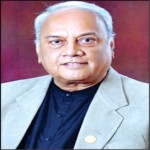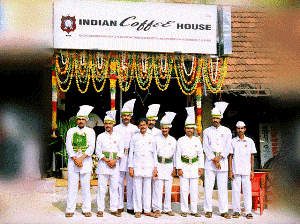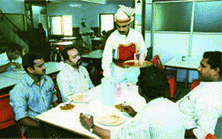
In the late 1960s, a high-ranking technician from the Jawa motorcycle company in the then-Czechoslovakia came to India. His brief was to train and guide staffers at the Mysore-based Ideal Jawa. The Czech company had a technological collaboration with the Indian firm, which manufactured its motorcycles, including the Yezdi Roadking. In Mysore, the technician, despite the barriers of language, struck up a friendship with BS Shinde, the factory foreman. One cool evening, as young motorcycle-loving men are wont to do, they debated about how fast the Roadking could actually go. The Czech technician was certain that the Roadking would struggle to breach 90kph. He knew the motorcycle inside out, he said, and had been building Jawas for the last decade or so. Shinde didn’t quite agree. He told his blond friend that he, too, had been around and among Jawas since he was a teenager, and that he had ridden it at around 120 a few times.
“He, I think his name was Vesely, couldn’t believe it,” says Shinde. “He immediately got out his stopwatch and laid a bet. If I could do 120 on the bike, he would, he said, give me a bottle of scotch. I accepted the challenge.” The two men, along with a couple of other fellow employees, rode into town. Shinde had to ride from Chamundi Hill to a certain point on the Lalith Mahal Road in a certain number of minutes, and he was to be timed by his sceptical friend. “Mysore was a lovely place to ride in those days; no traffic, very few people. I rode as fast as I could that day, and got that bottle of whisky,” says Shinde, with a mischievous twinkle in his eyes, which are clouded by cataracts.

Shinde, a spry 84-year-old, is not fibbing. He doesn’t need to. He has accomplished greater, and, possibly, more fulfilling tasks than riding a Yezdi at great speed. He was among Ideal Jawa’s first employees, and, when the company finally shut down in the mid-1990s, he was, perhaps, the last to accept the inevitable.
To many readers of this magazine, Jawas and Yezdis might be nothing more than a rumour, a motorcycle their fathers rode, the ones that sounded too loud for the modern age. But, back in the day, and we are talking of the 1960s and ‘70s here, Jawas and Yezdis were trending in India. They were cool, quick and easy to maintain. The actor Jeetendra corralled villains on a Jawa in Humjoli (1970); Amitabh Bachchan rode a Jawa 250 in Parvarish (1977); and Farooq Shaikh romanced Deepti Naval on one in Chashme Buddoor (1981). And, the Jawas and Yezdis young men rode back in those days were probably put together, at least initially, by Shinde.
Ideal Jawa was founded by Mumbai-based motorcycle dealers and enthusiasts Rustom and Farrokh Irani in 1960. It started out by selling Jawa and CZ motorcycles, and later moved to manufacturing the motorcycles under the brand name Yezdi. (The Indian-made motorcycles were named after Yazd, in Iran, where the Iranis hail from.) Shinde’s association with the Iranis started when he moved to Mumbai from Phaltan, near Satara, as a teenager and started working as a mechanic at their dealership, which sold Jawas, Sunbeams and BMWs. “I didn’t like the British motorcycles much, they were four-stroke, but the Jawas could really go. Two-stroke makes such a difference,” says Shinde, twisting an imaginary accelerator.
 When the Iranis decided to scale their business and move to Karnataka – they were invited to set up shop by Jayachamarajendra Wadiyar Bahadur, the then maharaja of Mysore – Shinde was assigned the task of setting up the facility. “When I came to Mysore in the early 1960s, there was nothing. Just some barren land and me. Even the watchmen came later,” he says, pointing in the direction of the location of the erstwhile factory, which is about 3km from his home, in the Baimantap Extension, in Mysore, and which today hosts a residential complex.
When the Iranis decided to scale their business and move to Karnataka – they were invited to set up shop by Jayachamarajendra Wadiyar Bahadur, the then maharaja of Mysore – Shinde was assigned the task of setting up the facility. “When I came to Mysore in the early 1960s, there was nothing. Just some barren land and me. Even the watchmen came later,” he says, pointing in the direction of the location of the erstwhile factory, which is about 3km from his home, in the Baimantap Extension, in Mysore, and which today hosts a residential complex.
For the next half a decade or so, Shinde put it all together, crank case by crank case. He was there when the first CKD consignments arrived from Czechoslovakia; he was there when the Iranis started making motorcycles under the Yezdi brand name, and he watched Ideal Jawa grow from a rudimentary assembly setup into a company that sold as many as 5,000 motorcycles a month. He was part of the Ideal Jawa factory team that raced at Sholavaram and won some hard fought victories, and he travelled the world, learning more about two-strokers. In many ways, the former mechanic was, to a bunch of Yezdi enthusiasts in 1970s Mysore, Mr Yezdi himself, and even today, his name crops up in Yezdi forums; he is “a stalwart” every Yezdi-head wants to meet.
 “My motorcycle was the 61st bike made by the company. I rode it in the rains and in the sun, I raced, I put together motorcycles. I was so obsessed with Yezdis that if one of them passed me by on the road and didn’t sound right, I would have this urge to adjust the air screw,” he says, cupping his ear with his gnarly fingers.
“My motorcycle was the 61st bike made by the company. I rode it in the rains and in the sun, I raced, I put together motorcycles. I was so obsessed with Yezdis that if one of them passed me by on the road and didn’t sound right, I would have this urge to adjust the air screw,” he says, cupping his ear with his gnarly fingers.
Shinde’s obsessive, blind loyalty to his employer, probably, made him miss the writing on the wall. When Ideal Jawa shut down in 1996, putting around 2,000 people out of their jobs, he was on an official visit to Tanzania, and learnt about the closure, he says, only after he returned to Mysore.
Raian Irani lives in a charming bungalow in the heart of Mysore. A Great Dane and a Dalmatian lope leisurely on its lawns; the living room has period furniture, and there are portraits of horses and framed butterfly displays on its walls. Die-hard Jawa and Yezdi enthusiasts of a certain vintage, especially in sleepy Mysore, regard Irani with a certain ambivalence. They still maintain that Ideal Jawa could have been better run and more prepared for the Japanese invasion of the 1980s, and accuse the Iranis of being lackadaisical in their approach. Raian Irani is a big-built man, with a fondness for single malt and big bikes. He also owns three Yezdis, though he doesn’t ride these days. Irani, who helmed Yezdi for a brief while in the late 1980s, tells me that there was complacency both on part of the owners and the employees. “When the Japanese entered India, the scenario changed completely. It was not just about two-strokes giving way to four-strokes, they introduced this new dimension of fuel efficiency, which had gained ground after the oil crisis in the late 1970s. ‘Kitna deti hai?’ started from there.

Could Yezdi have been saved? Would a tie-up with a Honda or a Suzuki have worked? Irani doesn’t think so. The odds, he says, were heavily stacked against the little Indian company. The Japanese ran streamlined, technology-driven operations in comparison to Ideal Jawa, which struggled with rising labour costs and the then government’s socialist policies. “A tie-up would never have worked. They needed scale, we simply didn’t have it.” The employees of Ideal Jawa, says Irani, especially those who stayed on till the end and turned down the VRS, imprudently hoped that things would get back to normal one day. The shutdown of Ideal Jawa was unfortunate, but it, says Irani, had to be done.
The Yezdi has made a comeback of sorts, especially in the last half a decade. Nearly every city in the country has a Jawa/Yezdi club, and July 13th, International Jawa Day, resonates rortily in India as well. And everyone seems to be in search of a ‘good Jawa or Yezdi’, from hipsters to software professionals. A Yezdi even featured in the recent movie Ishaqzaade, which starred Arjun Kapoor. After the closure of Ideal Jawa, Shinde, who was left with no savings of any kind, headed back home to Phaltan, and along with his brother, he started a lodge, which helped him and his family keep their heads above water. Shinde doesn’t have much to do with motorcycles these days. He mostly spends his time in Phaltan, and occasionally visits his grandson, in Mysore. But there are times, though, he tells me, when he hears that all too familiar exhaust note, and when that happens, he looks up, and looks back.
(Words: Murali K Menon, Photos: Shashank MB)
source: http://www.topgear.com / BBC Top Gear India / Home> Car-News / by Murali K. Menon, Photo: Shashank MB / November 2014


















